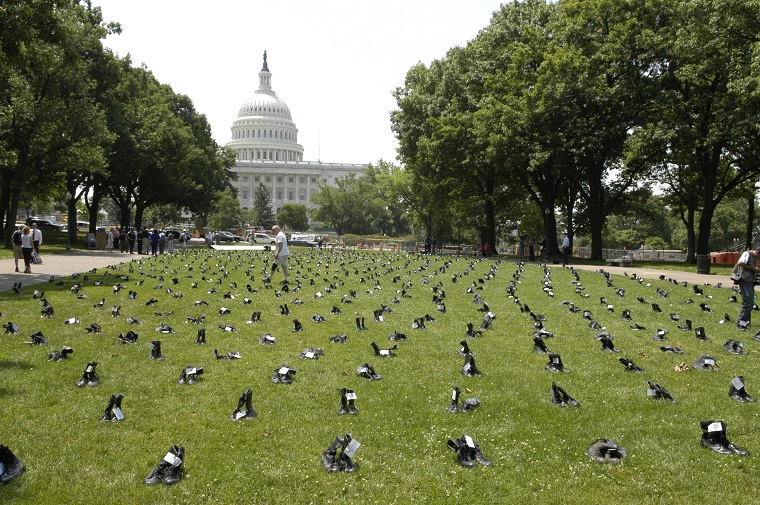
Working against the Authorization for Use of Military Force then and now
On Sept. 11, 2001, an attack on U.S. soil stunned the world. For many people, the United States’ safety and place in the world had never felt so precarious. In the following days and years, Congress passed reactive policies, which gave the president the authority to use military force and increased domestic surveillance.
Two of these pieces of legislation in particular, the 2001 and 2002 Authorizations for Use of Military Force (AUMF), vastly expanded the president’s ability to wage war – and their impacts continue to take a deadly and costly toll today.
The 2001 AUMF passed just three days after 9/11, giving the president authority for military force against al-Qaeda and any entity that aided the attacks on the World Trade Centers.
The 2002 AUMF authorized military force against Iraq, specifically. It was justified partly through accusations that al-Qaeda members were living there and that Iraq continued “to aid and harbor other international terrorist organizations.”
AFSC’s history of organizing against endless war
AFSC was one of the few national organizations that spoke out against the broad war powers being authorized by Congress at the time.
The Quaker commitment to peace meant that discussions around U.S. militarism and the need for active peacemaking were already well underway before the 9/11 attacks even occurred. Two dozen AFSC staff members had planned to attend a “Peacebuilding and Demilitarization Network Gathering” before 9/11, and the convening took place just a month and a half after the attacks. Even at this early stage, it was clear to the assembled group that U.S. foreign policy and military engagement with the world would be radically changed in the aftermath of the attacks. Responding to the U.S.’ proposed “war on terror” was a key proposal that came out of the event.
AFSC’s anti-war organizing took on a variety of forms, from movement building to developing a response to the rapidly changing framework for U.S. militarism.
In relation to the 2001 AUMF, AFSC called attention to how the “war on terror” was broadening beyond its initial scope. James Reilly, East Asia Representative for AFSC in 2002, wrote a policy report for Foreign Policy in Focus that accused the Bush administration of preparing “to take the war on terror on the road to East Asia.” The piece connected new global arms sales relationships, U.S. military bases, and militarized foreign policy in Asia to their “anti-terrorism” justifications.
AFSC also provided direct humanitarian aid to Afghan populations displaced by U.S. bombing campaigns, sending food, blankets, and other items to help alleviate the suffering magnified by the tragic events of September 11.
In relation to the Iraq War and the 2002 AUMF, AFSC led organizing around the “Peace Pledge.” Over 57,000 signatures were collected in opposition to the economic and military war in Iraq, and were then delivered to Congress. AFSC co-sponsored a follow up “Pledge of Resistance,” after Congress passed the AUMF. The pledge allowed individuals to publicly withdraw their consent from plans for war.
AFSC local offices in places like Los Angeles and Atlanta worked with partners to coordinate rallies and marches, drawing thousands of people into the streets to speak out against the war. Once U.S. servicemembers began to lose their lives in the conflict, AFSC’s “Eyes Wide Open” exhibition, made up of combat boots that represented the number of servicemembers’ lives lost during the conflict, toured the country. Michael McConnell, creator of the exhibit, once told an interviewer: “This is a public memorial that allows all of us to have some sense of public grief and mourning. And the public grief leads to political questions—why this war. You have to show the human face of an issue to people to both engage them and to help them understand the big picture.”
Ongoing work to repeal AUMF – and stop endless war
While the war against Iraq has ostensibly come to an end, the war on terror has a seemingly never-ending appetite for growth, and there is still an enormous amount of work for the peace movement. The debate over war powers continues, as both the 2001 and 2002 AUMFs remain in effect- and are still being used to justify U.S. military actions.
The 2002 AUMF was thrust into the spotlight after the administration claimed that it authorized the drone-strike assassination of Iranian General Qassem Soleimani, which brought the U.S. to the edge of war with Iran. The incident proves that leaving these authorizations on the books is dangerous, and Congress must do something to reclaim their War Powers.
Representative Barbara Lee, a consistent champion for repealing both AUMFs, has introduced a standalone bill (H.R. 256) that would finally end the 2002 authorization. In June of 2021, this bill passed the House, and can now be taken up by the Senate. Other bills and amendments that would repeal these AUMFs are regularly considered, including in the annual National Defense Authorization Act process.
The interest from Congress in repealing these harmful authorizations is encouraging. As our legislators and the public gain awareness of how the United States’ militaristic approach to resolving conflict has harmed communities around the world, we hope that the efforts will gain momentum.
In 2002, AFSC described its role in working to stop endless war by “challenging the prevailing darkness, bellicosity of spirit, and readiness to divide people into ‘us’ and ‘them.’” This continues to be our contribution today- we face many of the same challenges, as the United States’ continues to focus on a self-interested sense of national security at the expense of human dignity, global collaboration, and genuine peacebuilding work.
Almost two decades since 9/11, Congress continues to allow the president to exercise overly broad discretion over which geographic areas and which groups are legal targets for U.S. military action. Even though the effort repeal the AUMFs is an uphill struggle, it is important that we continue to speak out against war and the consequences of U.S. militarism both at home and abroad.
